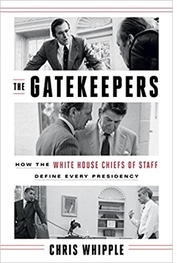Review of Chris Whipple's “The Gatekeepers: How the White House Chiefs of Staff Define Every Presidency”
 The troubles and performance of Donald
Trump’s chief of staff, Reince Preibus, during his first 100 days
on the job were predicted by journalist and documentary maker Chris
Whipple, author of The
Gatekeepers: How the White House Chiefs of Staff Define Every
Presidency (Crown, $28). In a January interview, he blamed
Priebus for many of the missteps of Trump’s first month in office,
saying, “At this rate, Priebus could challenge Donald Regan,
[Ronald] Reagan’s second chief, as the least effective in history.”
The troubles and performance of Donald
Trump’s chief of staff, Reince Preibus, during his first 100 days
on the job were predicted by journalist and documentary maker Chris
Whipple, author of The
Gatekeepers: How the White House Chiefs of Staff Define Every
Presidency (Crown, $28). In a January interview, he blamed
Priebus for many of the missteps of Trump’s first month in office,
saying, “At this rate, Priebus could challenge Donald Regan,
[Ronald] Reagan’s second chief, as the least effective in history.”
Ouch.
Whipple knows of what he speaks. The Gatekeepers is a fascinating book focusing on the chief of staff role from Nixon to Obama, ending with a bit of speculation about the man serving Donald Trump.
Observers of the political scene will find this book well worth their time and attention. Whipple’s style is lively and engaging, and he peppers the pages with colorful quotes and marvelous anecdotes. He’s done his homework, interviewing all 17 former chiefs and two presidents, as well as combing through the memoirs of those who had died.
Dwight Eisenhower was the first president to designate a “chief of staff,” though earlier presidents had staff who functioned in a similar role. In the Roosevelt administration, the title “secretary” was used, and the chief job was held by Louis Howe, Marguerite LeHand (the only woman to function as chief) and Edwin Watson. The job was as grindingly hard then as it is today. Roosevelt survived all three of his de facto chiefs, who all died of cardiovascular and lung disease before he was claimed by a cerebral hemorrhage in 1945.
Neither John F. Kennedy nor Lyndon Johnson had a chief, though Whipple says they could have used the help. “The White House chief translates the president’s agenda into reality,” Whipple writes. “When government works, it is usually because the chief understands the fabric of power, threading the needle where policy and politics converge.”
When Richard Nixon was elected in 1968, he chose ad executive H.R. Haldeman, whom he called his “pluperfect son of a bitch” and “Lord High Executioner.” Haldeman dealt with agenda items from the sublime to the ridiculous—Nixon had him run down information about vintages in the White House wine cellar—and sometimes staying the president’s worst illegal impulses. However, Haldeman was actively involved in the Watergate coverup and went to prison for it, the ultimate example of loyalty to his president. (The two never shook hands until the day Nixon fired him.)
Trump came to office promising to “drain the swamp,” and one thing you don’t see in his administration is a bunch of GOP re-treads. This was unusual. Most previous Republican—and Democratic—presidents have brought in seasoned old hands and plugged them into new roles. Before serving as George W. Bush’s vice president, Dick Cheney was Gerald Ford’s chief of staff and George H.W. Bush’s secretary of defense. (There is a common refrain from those who knew him when he was a rather loveable chief, “What happened to Cheney?”)
Presidents who decided to ignore the old hands often paid dearly for it, and none more so than Jimmy Carter. His chief was Hamilton Jordan, a hard-partying Georgian who antagonized Congress and just about everyone else he encountered, once purposely spilling a drink down a woman’s blouse in a bar. George H.W. Bush brought in his friend John Sununu as chief, who did the much the same thing, though his sin was not drunken antics but using expensive government travel for personal business such as attending rare stamp shows.
The best chief on the Republican side, Whipple says, was James Baker, who served Ronald Reagan. Reagan’s worst years began when Baker and treasury secretary Don Regan switched jobs. (Regan’s goose was cooked when he hung up the phone on Nancy Reagan.) The best Democrat chief of staff—and one of the most beloved figures in Washington—was Leon Panetta, who got Bill Clinton organized and focused … but could not prevent his dalliance with a White House intern.
John Dean, former counsel to Richard Nixon and a key figure in Watergate, wrote about The Gatekeepers in Time recently. He said, “I suggest Trump read Chris Whipple’s book. But he doesn’t read, or even have the patience to listen to the audio edition.”
Too bad.